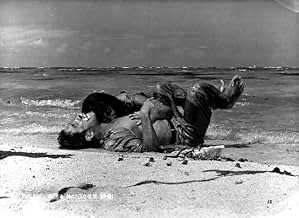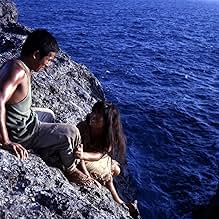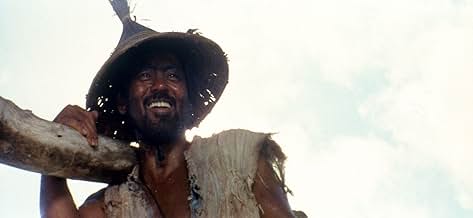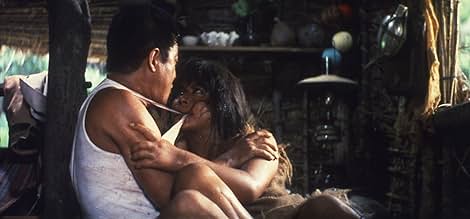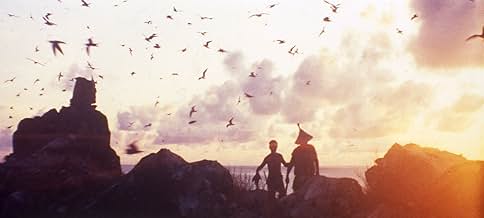IMDb RATING
7.5/10
2.1K
YOUR RATING
An engineer from Tokyo arrives on a drought-ridden tropical island to drill a well to power a nearby sugar mill. He meets the inbred Futori family, hated by the locals for breaking religious... Read allAn engineer from Tokyo arrives on a drought-ridden tropical island to drill a well to power a nearby sugar mill. He meets the inbred Futori family, hated by the locals for breaking religious customs.An engineer from Tokyo arrives on a drought-ridden tropical island to drill a well to power a nearby sugar mill. He meets the inbred Futori family, hated by the locals for breaking religious customs.
- Director
- Writers
- Stars
- Awards
- 5 wins & 1 nomination total
- Director
- Writers
- All cast & crew
- Production, box office & more at IMDbPro
7.52.1K
1
2
3
4
5
6
7
8
9
10
Featured reviews
The dual nature of man
A pantheistic society on a remote island in the Pacific find themselves in desperate need of fresh water. They invite Tokyo engineer Kariya to find the best sources of water in the area in order to pump it. As the story begins to unfold, Imamura lays out contrasting aspects of human nature by comparing Kariya's rational, scientific thought and the islanders' intuitive, spiritual vision of the world. (According to something said in one of the DVD's extra features, the island in the story was inspired by Okinawa, whose culture at the time still preserved some aboriginal characteristics and was different from most of Japan.)
Things begin to get more interesting when, to his utmost surprise, engineer Kariya is faced with some very primal needs of his own. At the same time, some of the island residents seem ready to put behind their adoration of the gods (sometimes dismissed as 'superstition') in order to concentrate on more practical matters. Others, like the Futori - an incestuous family regarded as beastly even by their neighbors' standards - prove to be particularly resistant to change.
I believe the Japanese director is addressing some of psychiatrist Carl Jung's ideas regarding the unconscious and man's innate need for myth. In his book, 'Man and His Symbols', Jung explains that in prehistoric times, man used to be completely intuitive and animalistic. Through a process of thousands of years, we've become more civilized and scientifically advanced. Yet, the primitive, emotional, non-rational aspect remains perfectly alive in our unconscious and cannot be fully tamed. This interior wilderness manifests itself in different ways, sometimes to our embarrassment, despite our best efforts to control it (a recurring theme in Imamura's films). Because our very existence and such a substantial part of who we are remain such a mystery to us, we use myth and a variety of symbols in an attempt to deal with these powerful, often puzzling, numinous forces within and without.
On a historical note, Imamura was allowed to work with a relatively large budget, but the film proved perhaps too strange and intellectual to please large crowds. This resulted in financial losses and the director vowed to never work with a large studio again.
Surreal and comical (although not outrageously so, like Imamura's last feature film, 'Warm Bridge Under the Red Bridge') 'Profound Desires of the Gods' leaves you with what could be described as a strong sense of psychic intensity.
Things begin to get more interesting when, to his utmost surprise, engineer Kariya is faced with some very primal needs of his own. At the same time, some of the island residents seem ready to put behind their adoration of the gods (sometimes dismissed as 'superstition') in order to concentrate on more practical matters. Others, like the Futori - an incestuous family regarded as beastly even by their neighbors' standards - prove to be particularly resistant to change.
I believe the Japanese director is addressing some of psychiatrist Carl Jung's ideas regarding the unconscious and man's innate need for myth. In his book, 'Man and His Symbols', Jung explains that in prehistoric times, man used to be completely intuitive and animalistic. Through a process of thousands of years, we've become more civilized and scientifically advanced. Yet, the primitive, emotional, non-rational aspect remains perfectly alive in our unconscious and cannot be fully tamed. This interior wilderness manifests itself in different ways, sometimes to our embarrassment, despite our best efforts to control it (a recurring theme in Imamura's films). Because our very existence and such a substantial part of who we are remain such a mystery to us, we use myth and a variety of symbols in an attempt to deal with these powerful, often puzzling, numinous forces within and without.
On a historical note, Imamura was allowed to work with a relatively large budget, but the film proved perhaps too strange and intellectual to please large crowds. This resulted in financial losses and the director vowed to never work with a large studio again.
Surreal and comical (although not outrageously so, like Imamura's last feature film, 'Warm Bridge Under the Red Bridge') 'Profound Desires of the Gods' leaves you with what could be described as a strong sense of psychic intensity.
For goers who do not mind dysfuntion
(1968) The Profound Desire of the Gods/ Kamigami no fukaki yokubô
(In Japanese with English subtitles)
PSYCHOLOGICAL DRAMA
Director Shohei Imamura personal project film involving an uninhabited somewhat tropical island and it's prehistoric islanders come to fruition once an engineer (Kazuo Kitamura) from Tokyo city attempts to make plans regarding the island as a whole, and transitioning it into a sugar cane factory. Meeting first is the eldest,Yamamori, (Kanjûrô Arashi), appointed as the engineer's protege, is the son, Kametaro (Chôichirô Kawarasaki), appointed priestess of Noro Uma Futori (Yasuko Matsui), an sexually repressed inbred, Turiko (Hideko Okiyama) and the oldest always chained son, Nekichi (Rentarô Mikuni) violated many superstitious rules regarding the islands customs and traditions.
Director Shohei Imamura personal project film involving an uninhabited somewhat tropical island and it's prehistoric islanders come to fruition once an engineer (Kazuo Kitamura) from Tokyo city attempts to make plans regarding the island as a whole, and transitioning it into a sugar cane factory. Meeting first is the eldest,Yamamori, (Kanjûrô Arashi), appointed as the engineer's protege, is the son, Kametaro (Chôichirô Kawarasaki), appointed priestess of Noro Uma Futori (Yasuko Matsui), an sexually repressed inbred, Turiko (Hideko Okiyama) and the oldest always chained son, Nekichi (Rentarô Mikuni) violated many superstitious rules regarding the islands customs and traditions.
Shôhei Imamura's forgotten masterpiece.
Shôhei Imamura was already a well known name in Japanese cinema by 1968, having worked as an assistant to legendary film-maker Yasujirō Ozu and with a string of light-comedy, drama and documentary successes under his belt. 1968's Profound Desires of the Gods was to be his biggest undertaking yet, however the film's production was fraught with problems, running wildly over-budget and with the original shooting schedule of 6 months spiralling to 18 months by the films completion, a lot was riding on the success of the film, for both Imamura and production company Nikkatsu - unfortunately for both, the film was a huge failure at the box-office, too obscure and unconventional to gain the mainstream success it's production costs demanded. After it's failure Imamura retreated to documentary work for more than a decade, while Nikkatsu would not make such a lavish, high budget production again for many years. This huge failure probably goes some way to explain the film's lack of recognition on the international stage. For many years it was entirely unavailable to English speaking audiences, but thankfully that all changed last year with Eureka! entertainment's deluxe blu-ray release finally opening up Imamura's lost and misunderstood masterpiece to an international audience.
Profound Desires of the Gods is an engaging, provocative and bizarre piece that ostensibly explores on a number of different levels the duality of Japan's relationship with it's own culture and tradition versus the tide of modernisation and influence from the outside world. The story takes place on the fictional, but obviously Okinawa-inspired, southern Japanese island of Kurage and centres on the lives of the Futori family, who hold the claim to the oldest blood-line on the island. It is quickly made apparent that the Futori's are heavily inter- bred and are shunned and ostracised by the island's community, who refer to them as 'beastly' and believe that their incest is responsible for the islands misfortune. The family's patriarch, old and possibly-senile Yamamori, is both Father and Grandfather to Toriko, a dumb-witted girl whose childlike manner belies her almost feral desire for sex, while Toriko's Mother and Yamamori's Granddaughter Uma is a 'noro' or seer, who lives away from the family at the local shrine (the last remaining fresh water source on the island). Meanwhile, Uma's Son Kametaro is the most normal of the group and struggles to come to terms with his incestuous feelings for his sister Toriko and the islanders distaste for his family, while his Father and Yamamori's son Nekichi is imprisoned by his Father at the bottom of a flooded pit for his crimes against the community (dynamite fishing, and attempting an illicit incestuous relationship with their seer, his sister Uma) and given the near-impossible task of dislodging a huge boulder that has blocked the flow of water to the island's rice fields.
The rice fields point to a recurring parallel in the film, representing Japan's traditional agricultural past versus the modern uptake of sugar farming that the islanders turn to after the rice fields become untenable. Yamamori's desire to see the rice fields restored represents his families struggle to retain their ways in the face of the islanders scorn, while the incestuous relationship his family is born from and the parallel it poses to the islands' creation myth (where two sibling deities are married) represents the uneasy relationship some have with their superstitious past and their desire to see it forgotten from the islands culture. This is the central theme of the film, which in itself is a product of the mindset of Japan as a whole at the time the film was made, a Japan almost embarrassed by it's past and wanting to be perceived as modern thinking on the world stage. Although the Futori's incest marks them as outcasts and the negative results of such relationships are on display for all to see, Imamura effectively paints the family as sympathetic characters, symbolising traditions and religious and superstitious beliefs that fall in the face of modernisation, while casting a disapproving eye on the effects Western influence ultimately has on the island.
Profound Desires of the Gods is a complex and often bewildering film that moves at a disjointed, almost leisurely pace. Imamura has us firmly positioned entirely as voyeurs for much of the film, always watching events unfold at a distance, his characters enveloped by wide-angle shots of the beautiful Okinawan scenery that provides us with a cinematic feast for the eyes. His themes of east versus west and tradition versus progress are always present, yet never hammered home until the films climax, leaving the viewer to piece together the entangled web of the Futori's relationships and admire the films cinematography and the natural beauty of Okinawa. And in that regard, the film is a huge success, making up for what it lacks in pacing and narrative with sheer visual beauty and a deeper subtext that ultimately paints Kurage island and it's inhabitants as an allegory for what Imamura perceived as an increasing abandonment of Japanese culture and tradition to serve modern and Western needs. Surreal and thoughtful throughout, accompanied by beautiful and expertly shot visuals and with a message that's as pertinent today as it was then, Profound Desires of the Gods most certainly isn't a film for everyone, but it is in equal turns an epic and singular piece that surely must rank among Imamura's best.
Profound Desires of the Gods is an engaging, provocative and bizarre piece that ostensibly explores on a number of different levels the duality of Japan's relationship with it's own culture and tradition versus the tide of modernisation and influence from the outside world. The story takes place on the fictional, but obviously Okinawa-inspired, southern Japanese island of Kurage and centres on the lives of the Futori family, who hold the claim to the oldest blood-line on the island. It is quickly made apparent that the Futori's are heavily inter- bred and are shunned and ostracised by the island's community, who refer to them as 'beastly' and believe that their incest is responsible for the islands misfortune. The family's patriarch, old and possibly-senile Yamamori, is both Father and Grandfather to Toriko, a dumb-witted girl whose childlike manner belies her almost feral desire for sex, while Toriko's Mother and Yamamori's Granddaughter Uma is a 'noro' or seer, who lives away from the family at the local shrine (the last remaining fresh water source on the island). Meanwhile, Uma's Son Kametaro is the most normal of the group and struggles to come to terms with his incestuous feelings for his sister Toriko and the islanders distaste for his family, while his Father and Yamamori's son Nekichi is imprisoned by his Father at the bottom of a flooded pit for his crimes against the community (dynamite fishing, and attempting an illicit incestuous relationship with their seer, his sister Uma) and given the near-impossible task of dislodging a huge boulder that has blocked the flow of water to the island's rice fields.
The rice fields point to a recurring parallel in the film, representing Japan's traditional agricultural past versus the modern uptake of sugar farming that the islanders turn to after the rice fields become untenable. Yamamori's desire to see the rice fields restored represents his families struggle to retain their ways in the face of the islanders scorn, while the incestuous relationship his family is born from and the parallel it poses to the islands' creation myth (where two sibling deities are married) represents the uneasy relationship some have with their superstitious past and their desire to see it forgotten from the islands culture. This is the central theme of the film, which in itself is a product of the mindset of Japan as a whole at the time the film was made, a Japan almost embarrassed by it's past and wanting to be perceived as modern thinking on the world stage. Although the Futori's incest marks them as outcasts and the negative results of such relationships are on display for all to see, Imamura effectively paints the family as sympathetic characters, symbolising traditions and religious and superstitious beliefs that fall in the face of modernisation, while casting a disapproving eye on the effects Western influence ultimately has on the island.
Profound Desires of the Gods is a complex and often bewildering film that moves at a disjointed, almost leisurely pace. Imamura has us firmly positioned entirely as voyeurs for much of the film, always watching events unfold at a distance, his characters enveloped by wide-angle shots of the beautiful Okinawan scenery that provides us with a cinematic feast for the eyes. His themes of east versus west and tradition versus progress are always present, yet never hammered home until the films climax, leaving the viewer to piece together the entangled web of the Futori's relationships and admire the films cinematography and the natural beauty of Okinawa. And in that regard, the film is a huge success, making up for what it lacks in pacing and narrative with sheer visual beauty and a deeper subtext that ultimately paints Kurage island and it's inhabitants as an allegory for what Imamura perceived as an increasing abandonment of Japanese culture and tradition to serve modern and Western needs. Surreal and thoughtful throughout, accompanied by beautiful and expertly shot visuals and with a message that's as pertinent today as it was then, Profound Desires of the Gods most certainly isn't a film for everyone, but it is in equal turns an epic and singular piece that surely must rank among Imamura's best.
deftly captures the alchemy of the natural world.
Trying to acknowledge the enigma of Japanese Cinema, outside the paddock of Akira Kurosawa (Seven Samurai) and Yasujiro Ozu (Tokyo Story), is a daunting yet arousing act. With Profound Desires of the Gods (1968), Shõhei Imamura redefined the rigorous notions of 'Japaneseness'. Because the Futori family retain the traditional belief that their island of Kurage was created through the sexual union of a brother god and sister goddess, the other more progressive islanders vilify them. When a Tokyo engineer arrives to supervise the creation of a new well, he unearths the mystifying extremism of the Noro (shaman). With Profound Desires, Imamura examines the dogma of Japanese mythology and investigates the disparaging effect of modernity and the ruinous consequence of Coca-Cola. It is a sizzling masterwork filled with Buñuelian surrealism, which deftly captures the alchemy of the natural world.
Exotic Masterpiece
I trust the director fully and his choices in course of action, this is truly the work of a master. Speechless. But I'll try to do a short review for my own sake.
Profound Desire of the Gods immerses one, for nearly three hours, in the community of Kurage, located in the in the tropics, on a small island with jagged cliffs, lost in the middle of the Pacific. Its amazing, from the wide and exotic photo to the allegorical representations of the human condition.
Profound Desire of the Gods immerses one, for nearly three hours, in the community of Kurage, located in the in the tropics, on a small island with jagged cliffs, lost in the middle of the Pacific. Its amazing, from the wide and exotic photo to the allegorical representations of the human condition.
Did you know
- TriviaOfficial submission of Japan for the 'Best Foreign Language Film' category of the 42nd Academy Awards in 1970.
- Quotes
Yamamori Futor: He shouldn't take money. The engineer is a god who came from beyond the sea. It will not do to take money for serving that god.
- ConnectionsFeatured in Cinéma, de notre temps: Shohei Imamura, le libre penseur (1995)
- How long is Profound Desires of the Gods?Powered by Alexa
Details
- Release date
- Country of origin
- Language
- Also known as
- Kuragejima
- Filming locations
- Ishigaki-jima, Ryukyu Islands, Japan(Spelling error)
- Production company
- See more company credits at IMDbPro
Contribute to this page
Suggest an edit or add missing content

